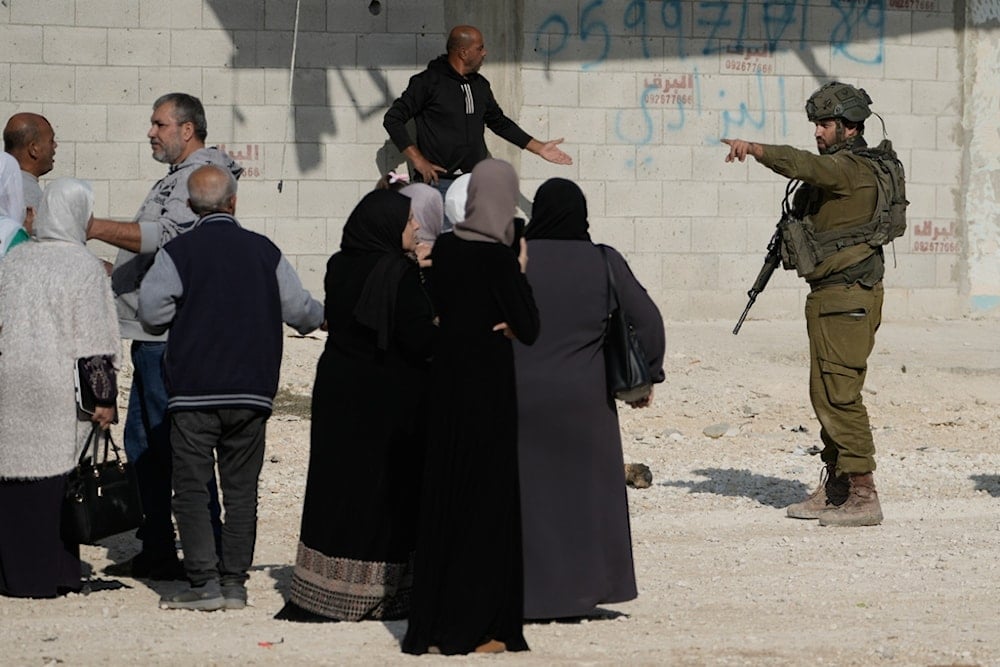Settlers attack Bedouin community as Al-Aqsa stormed in al-Quds
Settlers attacked a Bedouin community near Mikhamas, injuring Palestinians, as hundreds stormed Al-Aqsa and Israeli forces executed raids and arrests across al-Quds.
-

An Israeli soldier disperses people taking part in a protest calling for the return of displaced Palestinians to their houses in the Nur Shams refugee camp in the West Bank city of Tulkarem on Tuesday, November 18, 2025 (AP)
Several Palestinians and peace activists were injured on Wednesday after settlers launched an attack on the Bedouin community of Khallat al-Saddra near the town of Mikhamas, northeast of al-Quds. The assault caused damage to homes and vehicles in the area, according to local sources.
In a separate development, settlers stormed the al-Aqsa Mosque compound in al-Quds under the protection of the Israeli occupation police.
The Governorate of al-Quds reported that hundreds of settlers entered the mosque in successive groups through Bab al-Maghariba, conducting provocative tours and performing Talmudic rituals in its courtyards.
Arrests and raids in Bedouin communities
Earlier in the day, occupation forces detained three Palestinians from the Arab al-‘Ara’ara community in the Bedouin gathering of al-Hathroura, east of al-Quds, after raiding several tents. The detainees were taken to an unknown location.
In Nablus, Israeli occupation forces stormed the city from several directions and arrested a young man after surrounding his home on Abu Obeida Street. Military vehicles were deployed across various checkpoints, including Hawara to the south and Surra to the west, before detaining Obada al-Amoudi.
Meanwhile, in the Old City of al-Quds, occupation authorities handed demolition notices to four Palestinian families in Aqabat al-Khalidiyya, claiming their homes were “unfit for habitation.” The families stressed that the Israeli occupation has long prevented them from obtaining permits to repair or maintain the buildings, leaving them vulnerable to structural damage, later used as a pretext for demolition.
Renewed raids by soldiers, settlers
Israeli occupation forces imposed a security cordon on the town of Beit Ummar, north of al-Khalil, and detained more than 100 Palestinians, while simultaneously carrying out incursions into other areas across the West Bank. Simultaneously, Israeli settlers intensified their acts of violence and attacks in the region.
According to local sources, the Israeli forces have converted the town's main soccer field into a makeshift interrogation center and have begun gathering detainees there. The operation is supported by significant military reinforcements that were deployed toward the town in the early hours of the morning.
In a related development, the IOF sealed the family home of martyr Walid Sabarna after forcing the family to evacuate. The home was welded shut with iron sheets, and sources confirmed that during the raid, family members were assaulted and the property was damaged following on-site questioning.
Attacks on Palestinian farmers quadrupled since Oct. 7
According to a Tuesday report in The Guardian, with settlers stepping up a broader effort to intimidate and harm Palestinian communities, dozens of new incidents have occurred in recent days across much of the occupied territory.
Palestinian Farmers’ Union (PFU) records indicate that incidents of violence against its members have increased fourfold, rising from three or four per day before the war in Gaza. The PFU declared in a statement last month that these recent attacks represent a deliberate strategy to undermine Palestinian rural life rather than random acts.
Israeli authorities recently stopped activists and volunteers, who were on their way to assist Palestinians with the olive harvest, from reaching the village of Burin.
In recent days, settlers have vandalized cars near Sinjil, raided farmlands close to al-Mughayyir, and assaulted farmers in Beit Furik, east of Nablus. Near Beit Duqqu, agricultural workers and olive pickers were attacked. Similar incidents were reported in al-Farisiyah, Aqraba, and villages outside Qalqilya, where settlers burned olive trees and blocked access to farmland.

 4 Min Read
4 Min Read










